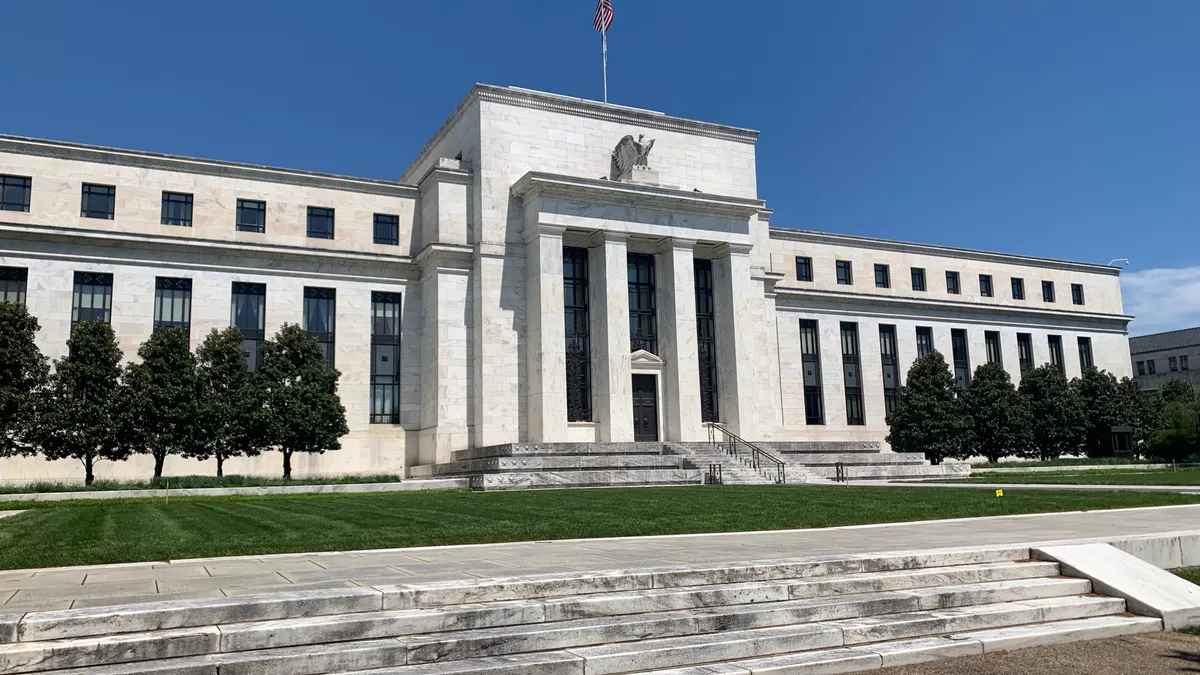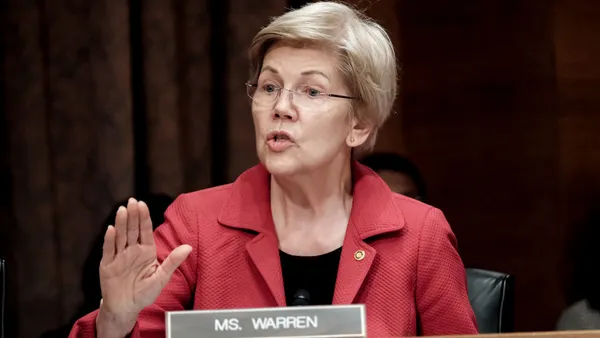Dive Brief:
- Custodia Bank is suing the Federal Reserve Board of Governors and the Federal Reserve Bank of Kansas City for the “unlawful delay” in processing its application for a master account, the bank said in a complaint filed Tuesday.
- The digital-asset bank, formerly known as Avanti, was granted a special-purpose depository institution (SPDI) license in the state of Wyoming in 2020. The bank applied for a master account with the Fed in October 2020 and has been waiting 19 months for its application to be approved, despite the Fed’s standard form agreement that states “[p]rocessing may take 5-7 business days,” according to the complaint.
- A master account would allow Custodia Bank to access the Federal Reserve’s banking system for clearing U.S. dollar transactions without having to use an intermediary bank, and is vital to its ability to operate effectively and efficiently, the bank said in the complaint.
Dive Insight:
Custodia claims the delay in processing its master account application is resulting in substantial, ongoing injury to the bank.
“The immediate injury is that the delay has forced Custodia to defer its solo entry into the financial services market in favor of a decidedly second-best and far more expensive alternative: launching with a correspondent bank — which has a master account — while Custodia awaits a decision on its long-pending application,” the bank said in the 44-page lawsuit.
Using a correspondent bank, Custodia asserted, is costlier and introduces counterparty credit risk and settlement risk.
Working with a correspondent bank also eliminates the competitive benefit of gaining a SPDI charter, “thus benefiting existing and entrenched competitors and ignoring Wyoming’s sovereignty as a state that has clear statutory authority to charter depository institutions,” the complaint alleges.
Caitlin Long, a former managing director at Morgan Stanley, founded Custodia under the name Avanti Financial Group in 2020. The bank was among the first to be granted an SPDI charter under Wyoming’s crypto-friendly law, passed in 2019.
“Through this lawsuit, Custodia seeks to ensure that its Federal Reserve master account application receives the fair dealing and due process guaranteed to it by both federal statute and the U.S. Constitution,” Nathan Miller, a spokesperson for Custodia Bank, told Banking Dive in an email. “Custodia has satisfied every rule applicable to it, and has gone beyond by applying to become a Fed member bank.”
Custodia said the Kansas City Fed received Custodia’s business plan in May 2020, months before the bank submitted its master account application. The reserve bank confirmed Custodia’s master account application is complete, according to the suit.
Custodia said it was informed in early 2021 by a representative of the Kansas City Fed that there were “no showstoppers” with the bank’s application.
The bank said the Kansas City Fed’s consideration and impending approval of its application was derailed when, in spring 2021, the Federal Reserve took control over the decision-making process.
“The result is that Defendants have failed to meaningfully consider — let alone decide — Custodia’s long-pending application,” the bank said in its complaint.
The continued delay prevents newcomers from introducing innovation and competition in the financial services marketplace and “benefits the established financial institutions whose interests are represented on the Board of Directors of the Kansas City Fed,” according to the complaint.
Should Custodia secure a master account with the Fed, it would be the first digital asset bank in the country to do so, according to CoinTelegraph.
Fed master accounts took center stage this year during Sarah Bloom Raskin’s February nomination hearing to serve as the central bank’s vice chair for supervision.
Sen. Cynthia Lummis, R-WY, appeared to accuse Raskin, during the hearing, of using her standing as a former Fed governor to help the fintech Reserve Trust — where she served on the board of directors — gain a master account with the central bank.
The Kansas City Fed denied Reserve Trust’s first application for a master account in June 2017, a month after Raskin joined the board of the Colorado-based startup.
Lummis said Raskin called the Kansas City Fed in August 2017 about the denied application. Reserve Trust was granted a Fed master account in 2018, the senator said.
The Fed in March proposed a tiered approach with regard to requests for access to master accounts and payment services. Institutions with federal deposit insurance would receive a “more streamlined level of review, those without insurance that are supervised by a federal banking agency would undergo an intermediate level of review, and those without insurance and not supervised by a federal bank regulatory agency would be subject to a stricter level,” the central bank said.
The following month, six banking trade groups called on the Fed, in a letter, to provide more clarity over the way it grants master accounts to nontraditional companies.












